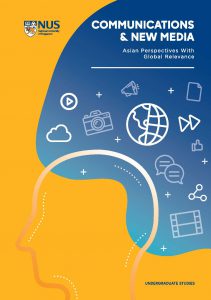Major in CNM
The core of the CNM Programme is new media studies, which focus on the societal impact of new technologies on our social, cultural, political and economic landscape. The Programme integrates media studies, mass communications, computational communication, communication management, interactive media design and cultural studies. The Programme cuts across the interdisciplinary intersections of social sciences, humanities, arts and computing, and prepares students as future hybrid media professionals through mastery in critical, creative, qualitative, quantitative and computational research. Our horizontal training will ground students in foundational, transferable and job-specific skills.
The learning outcomes of the CNM major are:
- To train students for advanced understanding of the discipline and application in communication and new media studies;
- To equip students with theory-based practices by integrating theory and practice;
- To professionalise students through industry immersion and work-integrated learning;
- To prepare students to be critically-engaged global citizens and understand the role of communication in the broader context through media and cultural literacies;
- To instil students’ ethical awareness and understanding of the workings of power, difference, diversity and inclusion;
- To foster students’ intellectual curiosity for socially impactful engagement;
- To build a learning community of practice in new media communication.
As part of CNM’s pedagogical commitment to integrate practice into theory, CNM introduced work-integrated learning into its curriculum. In 2018, CNM rolled out its Compulsory Internship Programme (CIP), a 20-week, 12 Units course to be undertaken by majors in their third year. CNM is the first department in the FASS to implement a compulsory internship programme in order to integrate experiential work learning into students’ undergraduate journey.
Key to the integration of practice and theory is the creative making and doing of design-led teaching. This is evident in our computational coding and interactive media courses on user experience design, game design, mobile interaction design, and digital storytelling. Design-led teaching is conducted in our CNM Studio: Multimedia Production Makerspace.
Graduation Requirements
The graduation requirements for CNM majors differ depending on the year in which a student is enrolled into NUS. Please click on the respective cohort to view its respective graduation requirements for all types of majors.
Students can read CNM as their primary or second major. A second major is taken on top of the primary major to broaden and complement students’ undergraduate education by allowing them to gain expertise in multiple subjects with interdisciplinary insights. A primary major under the College of Humanities and Sciences (CHS) comprises 15 courses, and a second major comprises 10 courses. Students can choose to declare a major when entering CHS, but have the option to change its later, or enter CHS with an undeclared major.
You may refer to the following sample study plan documents for some advice regarding your academic planning:
Study Plan for Cohort 2018-2020
Study Plan for Cohort 2021 (updated 6 Dec 2021)
If you have any specific query about majoring in CNM, please write to cnm.undergraduate@nus.edu.sg, or call +65 6516 4670.


